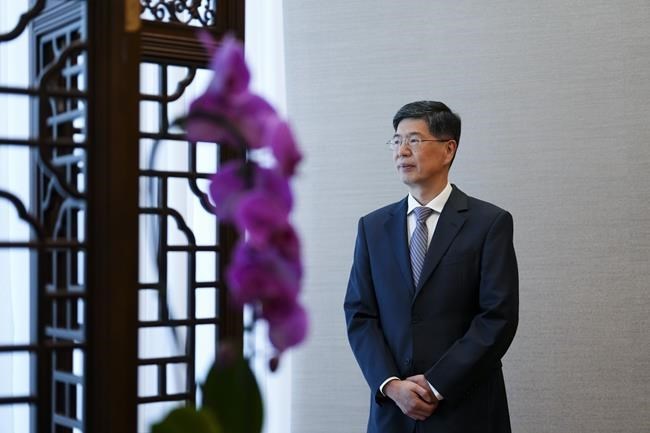OTTAWA — China's ambassador to Canada says an effort by Ottawa to restore normal military communication will hit headwinds if the navy sends another ship to the Taiwan Strait.
"We want dialogue. But it's really based on the principle of mutual respect," Cong Peiwu told The Canadian Press in a recent interview.
Late last month, Maj.-Gen. Gregory Smith — the Canadian military official tasked with communicating with countries such as China — said Ottawa was looking to establish a more open dialogue with Beijing’s officials.
"We're trying to get past just démarches, which is just speaking angrily to each other, to re-establish relationships," Smith said.
He told the House of Commons national defence committee that Canada seeks "a more baseline discussion" with China's defence attaché.
"We're taking a look, but we have to do that with our greater partners across government," he said, adding that Canada has not done any military exercises or co-operation with the People's Liberation Army since 2018.
Last year, Canada and the U.S. sailed warships through the Taiwan Strait as part of what Washington calls "freedom of navigation" operations.
In June, the U.S. released a video showing a Chinese ship cutting across the path of an American destroyer, forcing it to slow down. A Canadian warship was alongside the U.S. ship. Canada's navy made another transit through the disputed strait in September.
In October, Defence Minister Bill Blair accused China's military of unacceptable and unsafe behaviour after a fighter jet came within five metres of a Canadian surveillance plane over the East China Sea.
The dispute concerns China's understanding of its territorial range, which it argues extends past Taiwan.
Western countries and Taiwan's government believe the strait is international waters that foreign militaries can navigate without China's consent.
As part of its Indo-Pacific strategy, Canada has pledged to send three navy vessels to the region. None are currently there, though Ottawa plans to send a ship within months, to be joined by two others in the summer.
"The Canadian Armed Forces will continue to play an active role upholding the rule-of-law-based international order and promoting stability and prosperity in the Indo-Pacific," wrote Cpt. Véronique Sabourin on behalf of the Canadian Joint Operations Command.
"Planning is underway for HMCS Montreal to depart Halifax in the spring, en route to the Indo-Pacific."
Cong said having such a ship between Taiwan and mainland China undermines the One China policy Canada has held since 1970.
That policy, which many of Canada's peers follow, recognizes the People's Republic of China as the sole legitimate government of China.
But the policy doesnot endorse or challenge the Chinese government's stance on Taiwan, which is that it's a breakaway region that needs to be under Beijing's rule.
"We firmly oppose any provocative actions, especially on the Taiwan question. Anything that runs contrary to the One China principle — that's dangerous," Cong said.
"If people don't talk about this very basic principle, there's no basis for fruitful and meaningful dialogue or communication."
Cong said that's why Chinese Foreign Minister Wang Yi highlighted Taiwan's status in a call with his Canadian counterpart Mélanie Joly last month.
According to a readout of the call, the Chinese minister conveyed that his government sees it as a matter of respect that Canada avoid anything that can be interpreted as support for Taiwan's independence.
Carleton University professor Stephen Saideman said communications between militaries are crucial.
"They're trying to de-escalate after years of much tension," said Saideman, who is director of the Canadian Defence and Security Network.
"We don't want to have any kind of accident that can lead to escalation. So it makes sense for us to try to have this relationship," he said. "If you think that war is inevitable, you're going to start behaving in ways that make it so."
But Saideman is skeptical Ottawa and Beijing can have normal communication, given diplomatic strain that has involved foreign-interference allegations, trade restrictions and the detention of Canadians Michael Spavor and Michael Kovrig.
The two were imprisoned in what was widely seen as retaliation for Canada's detention of a Huawei executive for extradition to the U.S. They were released after more than 1,000 days when Meng entered into a deferred prosecution agreement with American authorities.
"I'm wary because China has been pretty damn aggressive over the past several years, and they've been pretty nasty to Canada," said Saideman.
"We want to have a good relationship but we also don't want to just cave into their demands."
Saideman said Canada could consider reducing the frequency of its ships sailing through the Taiwan Strait, as a way to continuework to prevent a Chinese invasion of Taiwan without being overly provocative.
He argued that stopping all sailing through the strait would only encourage China to push harder.
Part of the problem is that both Canadian and Chinese leaders have an incentive to play up tensions and say they're defending their citizens instead of seeking a nuanced relationship, Saideman said.
"I think we can change the optics of it, without actually caving into what the Chinese are demanding, because they basically say this is a Chinese lake and we should not be there at all," he said.
"There are ways to do it that may give their domestic politics less fodder, that may allow them to save face on this."
This report by The Canadian Press was first published Feb. 12, 2024.
— With files from Sarah Ritchie and The Associated Press.
Dylan Robertson, The Canadian Press

